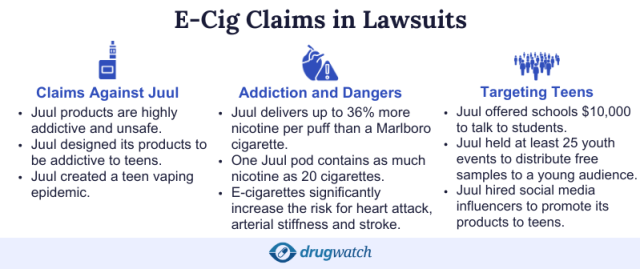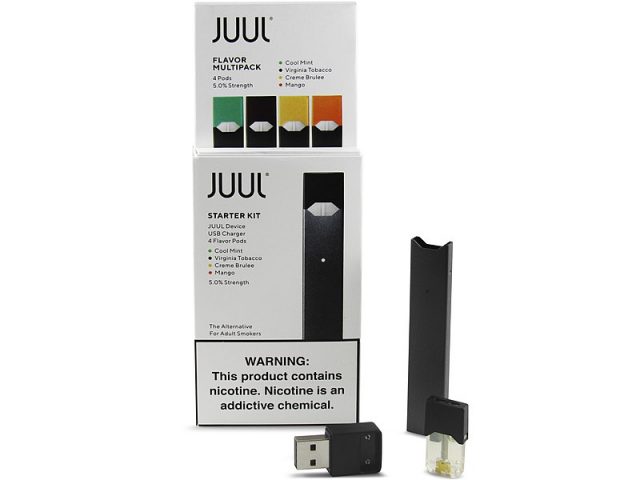E-Cigarette Lawsuits
Juul and other e-cigarette users filed vaping lawsuits against vape manufacturers after developing seizures, lung injuries, diseases and strokes. The lawsuits claimed individuals became addicted to e-cigarettes. Juul settled many of these cases in December 2022.
- Legally reviewed by Trent B. Miracle, Esquire
- Last update: July 1, 2025
- Defendant
- Juul Labs, Altria-Philip Morris, British American Tobacco, Imperial Brands
- Injuries in Lawsuits
- Seizures, hemorrhagic strokes, lung injuries, bronchiolitis obliterans organizing pneumonia, or BOOP, also known as cryptogenic organizing pneumonia, or COP, death, injuries from exploding e-cigarettes, injuries from e-cigarettes that catch on fire
- MDL
- MDL No. 2913 in the Northern District of California
- Settlements
- JUUL agreed to pay $40 million to settle a case filed by the state of North Carolina. Juul agreed to settle 10,000 individual lawsuits for about $1.7 billion in December 2022. A judge approved a $255 million Juul class action settlement in January 2023.
Juul Lawsuit and Settlement Updates
As of July 2025, there were Juul lawsuits from around the United States combined in multidistrict litigation (MDL), MDL 2913 under Judge William Orrick in the Northern District of California. The cases represent both class action lawsuits and individual personal injury cases filed in four states.
Our legal partners are no longer accepting these claims, and this page contains historical information about Juul litigation. However, we will continue to update this page with any key updates in the litigation.
The timeline below provides information for several Juul settlements and litigation updates.
-
July 2024:
Judge William Orrick issued an order detailing procedures to efficiently manage new and existing tribal plaintiffs after the settlement agreement entered last month. All proceedings involving the tribal litigants are stayed until the judge ends the stay.
-
June 2024:
Juul and Altria entered into a settlement agreement with several Native American tribal entities for an undisclosed amount. Also, this month, the FDA announced it was reversing its June 2022 Juul ban while it reviews case law and updated information provided by Juul.
-
March 2024:
Judge William Orrick gave final approval to a class-action settlement of $45,531,250 plus $255 million to settle claims that Juul marketed its products to teens and mislead the public about the addictiveness of the products.
-
May 2023:
Altria Group, part owner of Juul, agreed to pay $235 million to resolve at least 6,000 state and federal cases. “These cases include approximately 50 economic class actions, approximately 4,500 personal injury actions and approximately 1,500 government entity actions, including approximately 1,400 school district cases. These cases are covered by the agreement as well as cases in a related state court consolidated proceeding involving 750 cases,” Altria said in a press release.
-
March 2023:
Juul agreed to pay $23.8 million to the city of Chicago to settle claims that the e-cigarette maker deceptively marketed its products and sold vaping products to underage users.
-
January 2023:
a California judge approved a $255 million settlement in the Juul class action lawsuit. The Juul class action settlement resolves claims that Juul deceptively marketed its products.
-
December 2022:
Juul agreed to settle about 5,000 cases in the MDL, for an undisclosed amount. According to Bloomberg's sources, the amount was about $1.2 billion.
-
September 2022:
Juul agreed to pay about $440 million to 33 states to settle claims that the vape maker marketed its products to teens.
-
June 2021:
Juul agreed to pay $40 million to North Carolina in the first state lawsuit settlement.
Juul and Altria have settled most claims in the MDL, and the MDL remains open until any remaining cases are resolved. Some plaintiffs who elected not to accept the settlement also remain in the MDL.
“Without admission of fault or liability, Altria entered into Settlement Agreements with the Class Action, Personal Injury, and Government Entity Plaintiffs to resolve the vast majority of the remaining cases in this MDL,” Judge Orrick said in Case Management Order 23 issued on July 9, 2024.
“Without admission of fault or liability, Altria entered into Settlement Agreements with the Class Action, Personal Injury, and Government Entity Plaintiffs to resolve the vast majority of the remaining cases in this MDL.”
Why People Filed E-Cigarette Lawsuits
Many e-cig lawsuits target Juul Labs Inc. for intentionally marketing its vaping products to teens and deceiving customers about the addictiveness of vaping. The number of e-cigarette lawsuits has been growing alongside rapidly increased e-cigarette use among teens and young people.
- Juul marketed its products in a manner to attract minors
- The company promoted nicotine use
- Its marketing failed to warn that its nicotine products are more potent and addictive than tobacco cigarettes
- The company’s products are defective and unreasonably dangerous
The U.S. Surgeon General has said there is an “e-cigarette epidemic among youth.” Most e-cig lawsuits have been filed by young adults or parents of underage children who were unaware of the side effects of vaping.
Many people who filed lawsuits say they became addicted to using e-cigarettes which led to or worsened their conditions. They claim they were unaware that vape fluids contained high levels of nicotine, a highly addictive substance. Others also filed lawsuits after they were injured when their e-cigarette exploded or caught fire.

Big Tobacco Companies Named in E-Cigarette Lawsuits
Juul lawsuits also name Altria and Philip Morris, the Big Tobacco companies that make and market Marlboro and other tobacco cigarettes. Altria purchased 35 percent of Juul in December 2018.
Other e-cigarette lawsuits not included in the Juul mass litigation may also name other e-cigarette makers with ties to tobacco companies. These may include Imperial Brands, which markets Blu e-cigs, and British American Tobacco, which markets four e-cigarettes including Vuse and Vype.
Juul Case Study #1
Lisa Marie Vail v. Juul Labs et al.
The first wrongful death lawsuit against Juul was filed in a California federal court in October 2019.
Juul Use:
The mother of 18-year-old David Wakefield claimed he was first exposed to Juul marketing when he was 15, took up vaping sometimes afterward and continued vaping for years.
Injuries Alleged:
The complaint said that a year after he started vaping, Wakefield was hospitalized for three days due to breathing and lung complications. He was so addicted to nicotine that hospital staff had to use nicotine patches to ease his cravings.
Wakefield continued vaping after he was released from the hospital. His father found the teen had died in his sleep early on the morning of August 31, 2019, according to the complaint.
The lawsuit claimed Juul marketed its products to minors and the company’s “conduct and the defects in Juul products were a substantial factor in causing Wakefield’s death.”
Relief Sought:
Compensatory, restitutionary, rescissory, general, consequential, punitive and exemplary damages.
Juul Lung Disease, Seizure and Stroke Lawsuits
In addition to deceptive marketing and teen addiction lawsuits, other e-cig users have filed lawsuits that claim Juul caused lung disease, seizures, strokes and other injuries.
- Death of a loved one
- Heart attack
- Hemorrhagic strokes, or bleeding in the brain
- Lung diseases and injuries, including bronchiolitis obliterans organizing pneumonia (BOOP) and e-cigarette or vaping product use-associated lung injury (EVALI)
- Nicotine addiction that led to worsening health conditions
- Nicotine poisoning
- Pulmonary disease
- Respiratory failure
- Seizures
- Injuries from exploding e-cigarettes
- Injuries from e-cigarettes catching fire
We’ve listed a few lawsuits filed for various injuries claimed against Juul below. Most of the lawsuits that settled are linked to teen addiction and deceptive marketing.
Lung Disease
A pair of college students from Alabama filed a lawsuit in 2019 claiming they developed serious lung disorders from vaping Juul e-cigarettes.
Elizabeth Swearingen was a 19-year-old student at the University of Alabama. She had been a cross-country athlete in high school. But the lawsuit claims she “now has trouble breathing during the simplest of tasks.”
John Thomas Via Peavy was a 19-year-old student at Auburn University who had been using Juul e-cigarettes since he was 17. The lawsuit claimed he suffered “severe breathing problems after using Juul.” The complaint says Peavy continues to have chest-congestion and a loss of appetite.
The complaint claimed that both Swearingen and Peavy unintentionally swallowed vape fluids while using Juul.
Seizures
In April 2019, the U.S. Food and Drug Administration began investigating reports of seizures related to vaping. Most of the reports involved teens and young adults and people began filing lawsuits after the FDA announcement.
Parents of a 15-year-old Florida girl filed a lawsuit against Juul Labs, Altria Group Inc. and Philip Morris USA Inc. in 2019 after the teen suffered seizures they blamed on nicotine ingestion from vaping.
Erin and Jared NesSmith claimed their daughter became addicted to Juul e-cigarettes and suffered seizures. Juul vape pods each contain as much nicotine as a pack of tobacco cigarettes. The lawsuit claims she unintentionally swallowed e-cig fluids while using Juul.
Seizures are a known side effect of nicotine toxicity. But many teens don’t realize nicotine is an e-cigarette danger. A 2019 study in the journal Pediatrics found that 40 percent of teens did not even realize the vape fluids they used contained nicotine.
The FDA found many of the seizure reports it examined involved teens and young adults. Luka Kinard of North Carolina suffered seizures after vaping the equivalent of 80 tobacco cigarettes per day. He was 14 years old at the time and had to check into rehab to break his nicotine habit, according to a report in the Greensboro News & Record.
Stroke
Maxwell Berger sued Juul Labs in 2019 claiming his two-Juul-pods-a-day habit led to his massive stroke before he turned 20. Vaping two of the pods would mean he was ingesting as much nicotine as someone who smoked 40 tobacco cigarettes a day.
Berger said in his complaint that he started using a Juul e-cigarette while still a senior in high school in 2015. He claimed that two years later he was so addicted to nicotine that he was using the device every 10 minutes.

Source: Wikimedia Commons
He suffered a massive hemorrhagic stroke in July 2017. Hemorrhagic strokes can occur when a blood vessel bursts near the brain. Blood builds up in the skull, putting pressure on the brain and damaging it.
Berger’s lawsuit claimed he needed three brain surgeries and spent 100 days in the hospital as a result. The complaint said he suffers paralysis on his left side, speech impairment and loss of half his vision in each eye.
A 2019 study presented at the International Stroke Conference found e-cigarette users had higher risks of stroke and heart problems than non-users. The researchers found e-cig users had a 71 percent higher stroke risk, 59 percent higher heart attack risk and a 40 percent higher heart disease risk.
Contaminated Vape Pod Lawsuit
A former senior vice president at Juul sued the company in October 2019, claiming he was fired after he raised alarms over 1 million contaminated, mint-flavored Juul pods shipped to retailers and consumers. The lawsuit did not specify the exact type of contamination.
Siddharth Breja’s lawsuit claimed Juul “refused to recall those contaminated pods or even issue a product health and safety warning.” It also claimed the company sold expired products over his repeated protests.
The company’s former CEO, Kevin Burns, told CBS This Morning in September 2019 that Juul’s products were legal and tested for toxicity. He said Juul would not sell a dangerous product.
Ultimately, Breja lost his lawsuit in July 2023 and was ordered to pay some of Juul’s legal fees.
Calling this number connects you with a Drugwatch.com representative. We will direct you to one of our trusted legal partners for a free case review.
Drugwatch.com's trusted legal partners support the organization's mission to keep people safe from dangerous drugs and medical devices. For more information, visit our partners page.




